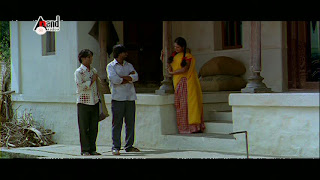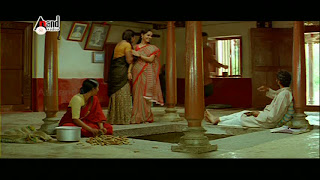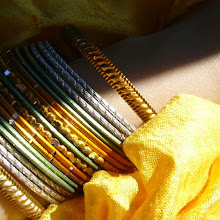Kavita Lankesh, the director, adapted one of her late father's novels for this film, and I must confess reading that got me interested in her debut venture, Deveeri, also an adaptation, starring Nandita Das. I would also not mind reading some of P Lankesh's writing, but I have a feeling those will be even harder to find than Kavita's movies. Surprisingly, she is quite well known, and I say surprisingly because this is one of only a handful of articles that I could find about the film. Maybe they just don't write about her in English so much... heh...
 |
| Such a cutie too! |
So here's the thing: I usually avoid women writers, they bore me to tears. (Sorry feminists!) It's not that they don't have anything of note to say, it's just that their writing style doesn't strike me as terribly original or remarkable, even when the stories are interesting. I see no benefit in reading something that I could write myself. Now I'm sure that there is a handful of women out there who are fabulous writers, but I have yet to find them and to be honest I am not very interested in doing that research.
But that said, it's funny how a lot of my favourite films were written and/or directed by women: Luck By Chance, Dhobi Ghat, Mr and Mrs Iyer, and now Avva. In a book it annoys me to go through all the tribulations and emotions of one character, over pages and pages of inner thoughts. In a movie however, I find it absolutely delightful. And I noticed that when a woman directs a movie she finds a way to add a special kind of depth that is not coming from the witty script, nor is it coming from the objects and people placed in a frame, nor, as with other directors is it coming from the multiple layers of gold, glitter and jewels (yeah, you know who you are!). Instead it seems to come from somewhere inside each character. A small scene like Mrs Iyer turning away and praying because she drank water from a bottle that had been touched by a Muslim man holds so much meaning with hardly any words spoken.
 |
| If you think she's about to throw up, yes, she is! |
Now it could be argued that these films are such a delight because they benefit (for the most part) from excellent actors giving it their best. No doubt about it. But I still give a lot of credit to the director for bringing out that best, which not all directors can.
But let me be honest, all this had nothing to do with me purchasing Avva blindly. I had no idea about the director, the actors or the topic. I just thought the picture on the cover looked neat. I know, I know... so many good recommendations I get from people around here, for great movies, and yet I go out and buy (potential) garbage on my own. Don't worry, I have since chastised myself by watching the Bollywood classic Teesri Kasam.
 |
| Isn't |
So back to Avva, it turns out that the young heroine was a newcomer, Smitha (probably because Nandita Das was too old for the part) and the hero is a well-known crowd pleaser, Vijay. Whoever they are, they were both pretty darn awesome!
But not as awesome as the real heroine of the film, Ragavva, played by veteran actress Shruthi, who I would love to see more of.
Ragavva, to make a long story short, lends money for interest. She's a widow and has to somehow make a living, while also working on getting her only daughter married. Pretty and small minded as she is, Savithri (Smitha) has a collection of suitors at her doorstep (literally!), but she has no dowry and the one suitor who would take her regardless is from a lower caste (Vijay).
Quite a busy doorstep that one! Which brings me to a random observation: a lot of the action in the film, something like 90%, takes place on various doorsteps or with open front doors in the background.
Just another one of those small touches revealing the village mentality where nothing can be hidden inside the four walls of a house. No coincidence then that the immensely gratifying final scene also takes place on Ragavva's doorstep. But I won't spoil that one for you.
Avva reminded me a lot of The Blue Umbrella in the way it captures the village life with all its ups and downs, governed by ancient mentalities and small but meaningful gestures.
 |
| Ragavva's reverence in front of money is quite endearing |
The village life may seem like just a backdrop, but it is a richly sewn one. Every character that comes and goes leaves their story in memory for further analysis and questioning: is education really that valuable if a girl's marriage and life is compromised by it because she cannot find a man more educated than her? Is a priest who does not believe in God still a priest? Is it the man's fault or the woman's if she leaves him for not being able to perform in bed? Is there life after death? Ok, that last one was just for jokes, but truly a great deal of issues are brought up just by observing the secondary characters in the film.
Beyond all that, the movie for me is made by the character of Ragavva, with her potty mouth and expressive face. As a side note I am a little disappointed that all the dirty swear words that she allegedly uses were translated as "rascal" and "scoundrel". But even so, her badassness comes through in her body language, fierce looks and menacing hand gestures.
 |
| That's a Rangavva version of "Rrrhhhey!" |
The love story between the two youngsters is shown in glimpses of increasingly steamy moments, which could have gotten the film into trouble with the censor board, but I agree with the director that they help build up the story. They never cross the border into tasteless either, so any criticism of these scenes is unfounded in my humble opinion. One never gets to find out why the two love each other, other than for physical reasons, but then in a village where every conversation gets reproduced on loudspeakers, there hardly seems to be any room left for proper courtship and sweet nothings whispered in the lady's ear.
And while on the topic of the village loudspeakers, in this film they come in the form of a young boy who evidently has not yet mastered the fine art of silence. For this but also for some other random reasons, he always ends up getting slapped or chased with a broom by someone and to be honest I can't say I felt sorry for him most of the time. The movie has a fair amount of people getting physical with each other, but it seems to be part of their way of life so unlike other films that show domestic violence these scenes did not turn my stomach upside down. Though clearly they did make enough of an impact for me to mention it in this review.
Lest I give the impression that this film is more serious than it is, I must also mention that there is a song with Savithri and one of her suitors that looks like the 70s just had to choose between a bottle of kool aid and a bowl of crack and could not make up their minds which one to pick. In fact, it's so trippy that youtube doesn't even have it! Ok, so maybe it's not the craziest acid trip we've ever seen, but it is a lot of fun, I'm a little bummed that I can't find it, so I'll have to settle for screencaps.
You know I'm usually not in favour of unrelated comic relief, but this song was just gold and not something I ever thought I would see outside an 80s Chiranjeevi movie (love you, Chiru, but you know you're guilty of worse!).
The only major criticism that I can bring to this film is that it sometimes seems to lose direction. It held my attention because for me each one of those directions was well worth exploring, but if one is only interested in the main story, they might feel bombarded with too many side plots along the way.
Other than that, hats off to Kavita Lankesh and I am sure to remember this name now. After all, we see so few female directors in India that it's not very difficult to keep an eye on all of the good ones. Especially when some are just men in the guise of women (I still love you, Farah Khan, but sense and sensibility were never your forte).















4 comments:
Hi, I've been reading your blog for a while, but this is the first time I'm commenting. Thanks for this review. The movie sounds interesting, but not really that new -- "tough" characters like Ragavva were a staple of south Indian movies for a long time, at least until the 80's when the "hero worship" phase started. And even today, they are there in supporting roles, such as Prakash Raj's mother in Okkadu.
On the film itself, I can think of two reasons why so much action takes place on the doorstep. In a household of only two women (or even in a gender balanced household if no men are present), men would not normally go inside unless they are relatives. I am curious: did any women characters go inside the house? The other reason I can think of for why the hero, at least, would not be allowed inside is that, besides being an unrelated man, he is also from a different caste.
If you're interested in work by women directors, you might want to explore the films of Vijaya Nirmala, who I believe holds the Guinnes record for most number of films directed by a woman. She is a former heroine herself, and married to the Telugu actor Krishna. The two of them were quite a hot and hit jodi. Another female director of interest, who was not so prolific, was P. Bhanumathi. See if you can find her film Chandirani, which I think was made in Telugu, Tamil, and Hindi, and was, in its day, the first film to be directed by a woman. However, it may be difficult to find, especially with subtitles, as its from a long time ago (1940's?)
Nice to hear about a female director I don't know and a film industry I don't really know (haven't seen any Kannada films). I often think about the differences between female and male directors, and why there are so few female directors. In India, I think that obviously many women don't even get to dream about being directors, but also many don't feel like it. In other countries, I think it's mostly the "don't feel like it", because I think women are more likely to dream of being a star; an actress or a singer (or both), while men don't always need that big, obvious attention.
I personally enjoy both films and books by women, and also by men, I mean I really don't care. Off course, one could say that there are some general differences between the films and books, but I really like that.
Hey MM! Nice to see you here and thank you for the comment! I looked up your first recco, and she seems to have directed quite a bunch of movies. Do you have one or two favourites that you can recommend? I might pick all the duds if left on my own, my luck runs out very quickly with blind shopping :)
I haven't delved into the old Southie movies yet, so you would know better about the badass ladies of the 70s, but for me this one was intriguing not because she was new (although such a character right at the centre of the story is a rare sighting for me), but because she stroke a very fine balance between a soft heart and a hard shell, which made her endearing throughout.
Oh and about the threshhold thing, the women were going in and out of everyone else's home all the time. It's not, I think, a question of who was allowed where (though of course, to your point the hero and the other suitors were kept out for obvious reasons) but the placement of the open doors inside the frame seemed intentional too, even when the scene was happening inside the house. I could be wrong, but at least to me it seemed intentional and gave you the feeling that anyone could walk in at any time (and in fact several characters do) and nothing was private. I was also watching Teesri Kasam yesterday and the same thing happens there: there is never a space that is private, whether it's the bullock cart or the fair tent, it's all open for everyone to access. Just thought that was interesting from a film maker's point of view. It sure seems like a deliberate choice.
Hey, Lime(ette)! Ha! Well, I knew I might get called on my shameless generalizations about women or men directing, so I thought about putting some sort of disclaimer there, but then realized that of course everyone will know these are strictly my opinions, so I gave up on the disclaimer :) And I totally agree with you on enjoying both male and female directors, I was just trying to find out what makes so many movies that were directed by women stand out as my favourites.
As for why there are so few female directors, I confess I am clueless on that answer, but the West is not very prolific in female directors either, so this is definitely not a case of India being behind the times or anything like that...
And don't worry, I haven't ventured very far into some of the regional cinema myself, just getting my nose out with this one, and have some Malayalam movies in queue, we'll see how that fares :)
Post a Comment